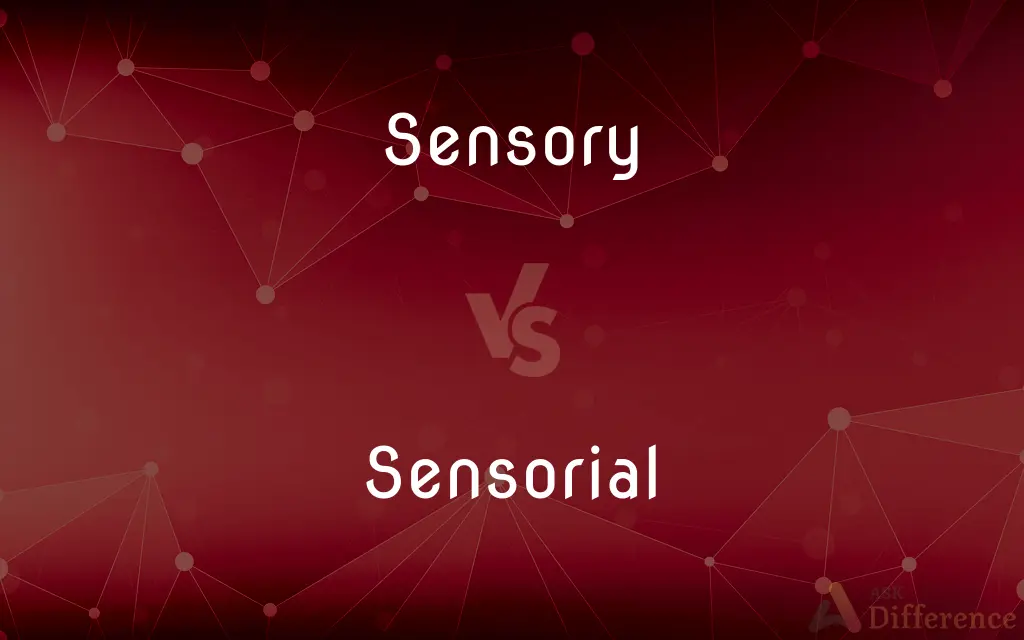Sensory vs. Sensorial — What's the Difference?
Edited by Tayyaba Rehman — By Maham Liaqat — Updated on April 14, 2024
Sensory relates to senses or sensation, focusing on bodily perceptions; sensorial pertains more to the sensory experience, often in a broader, more abstract context.

Difference Between Sensory and Sensorial
Table of Contents
ADVERTISEMENT
Key Differences
Sensory primarily refers to something related to the senses or sensation, directly involving the physical senses. On the other hand, sensorial also deals with the senses but often conveys a more nuanced, experiential aspect, emphasizing the quality or effect of sensory perceptions.
Sensory experiences are usually discussed in biological and physiological contexts, emphasizing how organisms perceive stimuli. Whereas sensorial experiences might be highlighted in discussions about art or dining, where the experience itself can be as important as the perception.
Sensory information is crucial in scientific studies of human and animal behavior, focusing on how sensory organs operate and respond. Sensorial, however, is more likely used in subjective descriptions of experiences, such as those involving aesthetics or emotions.
The term sensory is used in medical and health-related fields to describe symptoms or conditions affecting the senses, such as sensory impairment. In contrast, sensorial might appear in educational contexts, particularly in methods like Montessori, which emphasize engaging children's senses for learning.
In technology, sensory inputs are critical for developing devices that mimic human senses, such as touch-sensitive screens. Sensorial experiences in technology might refer to user interface designs that enhance the user's interaction through appealing visuals and feedback.
ADVERTISEMENT
Comparison Chart
Definition
Relating to senses or sensation
Relating to sensory experience
Contexts of Use
Biological, medical, technological
Artistic, educational, experiential
Focus
Physical perception mechanisms
Quality and effect of perceptions
Common Fields
Medicine, biology
Art, education, user experience design
Example of Application
Sensory adaptation in biology
Sensorial materials in Montessori schools
Compare with Definitions
Sensory
Relating to sensation as opposed to intellectual or emotional aspects.
Sensory experiences can bypass cognitive processing.
Sensorial
Relating to the perception or appreciation of sensory stimuli.
Sensorial marketing uses appealing visuals and scents to attract customers.
Sensory
Involving sensory organs or the reception of stimuli.
Sensory input is crucial for balance and coordination.
Sensorial
Involving complex sensory impressions.
The chef’s new dish is a sensorial delight combining textures and flavors.
Sensory
Affecting or intended to affect the senses.
A sensory garden is designed to stimulate sight, smell, and touch.
Sensorial
Designed to stimulate the senses.
The art installation offers a profound sensorial experience through interactive elements.
Sensory
Pertaining to the senses or sensation.
The sensory nerves transmit information to the brain.
Sensorial
Pertaining to or involving sensory experiences.
Sensorial teaching methods are popular in early childhood education.
Sensory
Connected with the neurological processes of sensing.
Sensory overload occurs when one or more of the body’s senses experiences overstimulation.
Sensorial
Focused on enhancing sensory perception.
Sensorial activities in Montessori education help develop a child’s tactile senses.
Sensory
Of or relating to the senses or sensation.
Sensorial
Of or relating to sensations or sensory impressions.
Sensory
Transmitting impulses from sense organs to nerve centers; afferent.
Sensorial
Of or pertaining to sensation or the senses; sensory.
Sensory
Of the physical senses or sensation.
Sensorial
Of or pertaining to the sensorium; as, sensorial faculties, motions, powers.
Sensory
(neuroanatomy) Conveying nerve impulses from the sense organs to the nerve centers.
Sensory neurons
Sensorial
Involving or derived from the senses;
Sensory experience
Sensory channels
Sensory
The sensorium.
Sensory
(obsolete) An organ or faculty of sense.
Sensory
Same as Sensorium.
Sensory
Of or pertaining to the sensorium or sensation; as, sensory impulses; - especially applied to those nerves and nerve fibers which convey to a nerve center impulses resulting in sensation; also sometimes loosely employed in the sense of afferent, to indicate nerve fibers which convey impressions of any kind to a nerve center.
Sensory
Of a nerve fiber or impulse originating outside and passing toward the central nervous system;
Sensory neurons
Sensory
Involving or derived from the senses;
Sensory experience
Sensory channels
Sensory
Relating to or concerned in sensation;
The sensory cortex
Sensory organs
Common Curiosities
How is sensory used in medicine?
In medicine, sensory often describes symptoms or conditions that impact sensory organs or perception.
What distinguishes sensory from sensorial in usage?
Sensory is more clinical and directly related to the senses, while sensorial is more abstract and experiential.
Can you give an example of a sensorial activity?
A sensorial activity could involve using different materials to explore textures and smells, as in Montessori education.
What makes an experience sensorial in art?
In art, an experience becomes sensorial when it significantly engages and stimulates one or more senses.
What is a sensorial experience?
A sensorial experience involves a complex, often aesthetic appreciation of sensory stimuli.
Why is sensory information important?
Sensory information is vital for understanding environmental stimuli and responding appropriately.
What does sensory mean?
Sensory refers to anything related to the senses or sensation.
Is sensory related only to human senses?
No, sensory can refer to any organism’s sensory systems and processes.
How do sensorial elements enhance learning?
Sensorial elements, such as hands-on materials, enhance learning by engaging multiple senses, aiding in deeper comprehension and retention.
How does sensory overload affect individuals?
Sensory overload affects when all give senses give more information to brain, and the brain response it as threatening situation and enters in freeze mode.
Share Your Discovery

Previous Comparison
Adopt vs. Implement
Next Comparison
Recognisable vs. RecognizableAuthor Spotlight
Written by
Maham LiaqatEdited by
Tayyaba RehmanTayyaba Rehman is a distinguished writer, currently serving as a primary contributor to askdifference.com. As a researcher in semantics and etymology, Tayyaba's passion for the complexity of languages and their distinctions has found a perfect home on the platform. Tayyaba delves into the intricacies of language, distinguishing between commonly confused words and phrases, thereby providing clarity for readers worldwide.














































